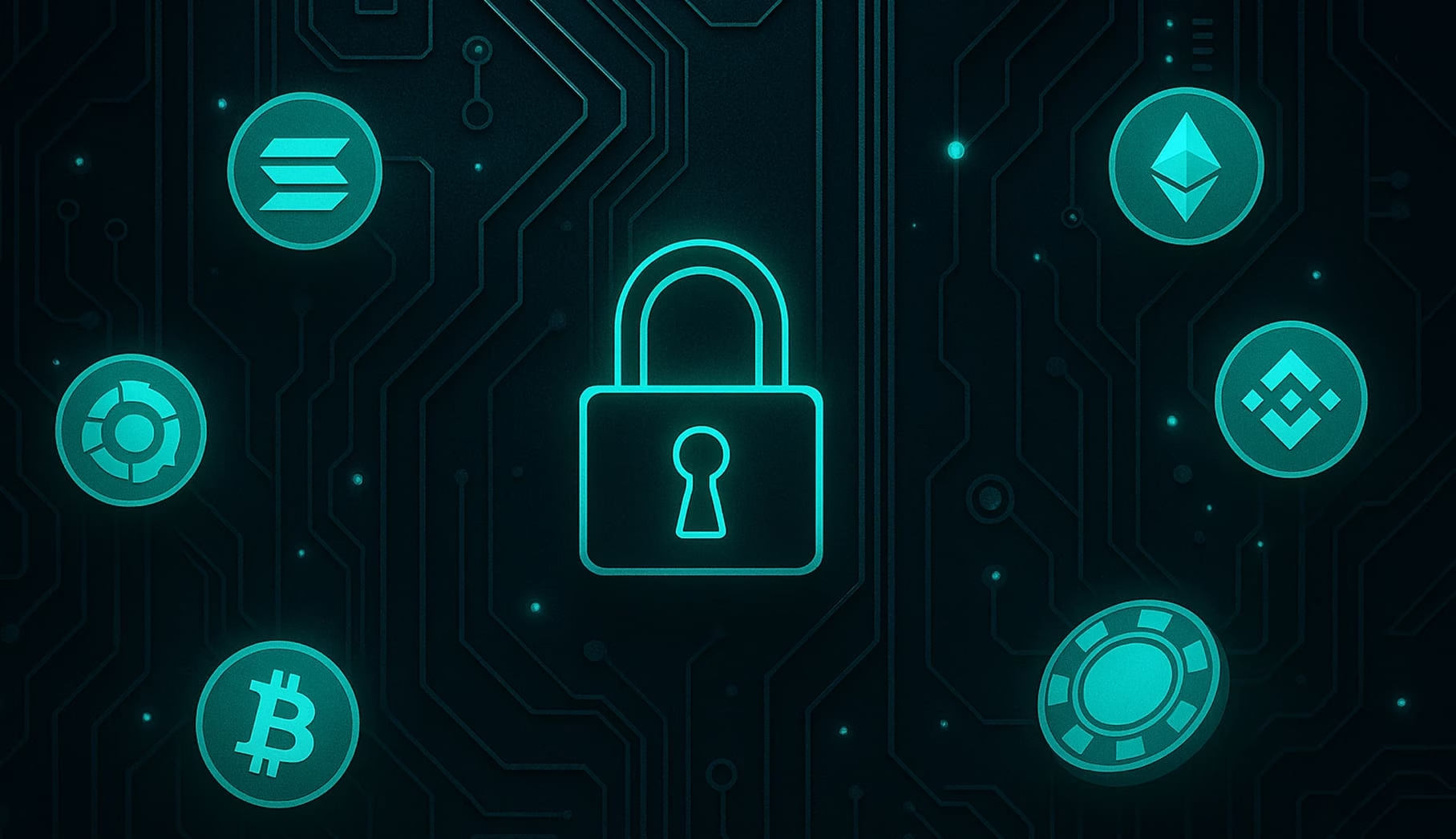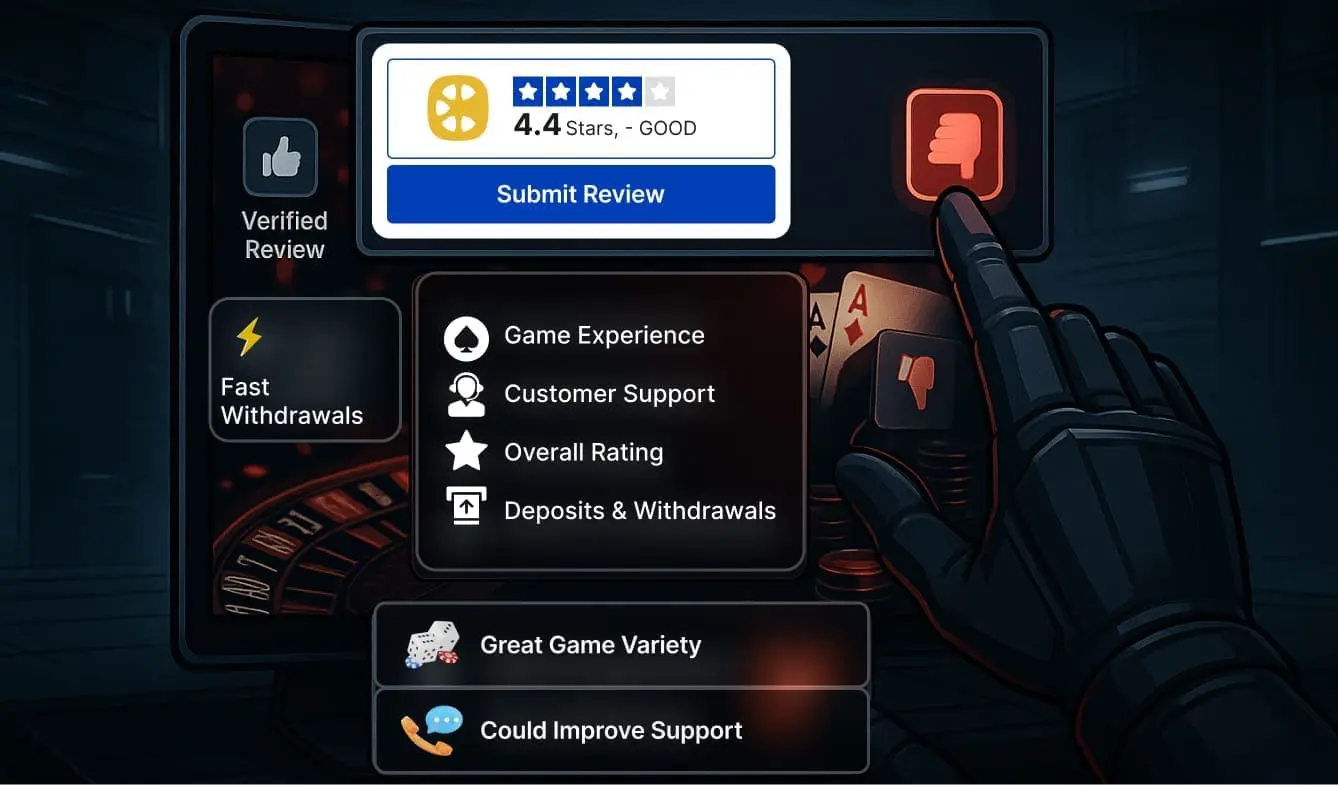
Practical guide to staying safe when playing at crypto casinos
In this original CoinBets guide, I’ll explain how you can take some simple steps to help secure your crypto while gambling at crypto casinos.
I’ll look at how to avoid common scams, the pros and cons of different crypto wallets, and how to spot dodgy token projects. To give some perspective, I’ll also consider how the crypto space is affected by organized crime and emerging technologies like AI.
So, if you want to effectively secure your crypto and minimize risks while gambling, keep on reading.
Crypto Gambling — Benefits and Risks
Crypto casinos offer many advantages over traditional online gambling sites. These include more privacy, provably fair games, lower fees, and faster transactions.
However, while the decentralized nature of blockchain technology allows you to bypass middlemen and enjoy more control over your funds, it also places more responsibility on your shoulders. To stay safe, it is important to understand potential risks and take the appropriate precautions to secure your cryptocurrency.
Understanding the Specific Risks
The most critical thing to understand is that cryptocurrency transactions are, by their very nature, irreversible. This means that both human error and malicious attacks can lead to permanent losses.
While the transparency of the blockchain allows anyone to see transactions, identifying the individual parties involved is difficult. Ironically, this pseudonymous quality is exactly what makes crypto so attractive to both security-conscious players and hackers.
Hacking and Cyber Attacks
Malware
Malicious software installed on your device to spy on your activity. Tools like keyloggers can record what you type — including sensitive information such as passwords and recovery phrases.
Exchange Breaches
If you have funds sitting in a cryptocurrency exchange wallet, it is vulnerable to hacking. Even large exchanges, notably Mt. Gox and Bitfinex, have been hacked, resulting in the loss of billions of dollars worth of cryptocurrency.
Scams and Fraudulent Sites
Fake Crypto Gambling Sites
These fake casinos look like legitimate platforms, but if you try to withdraw winnings, you can’t. They lure players in with huge bonuses and promos but will disappear into the night at some point — taking your funds with them.
Phishing
Phishing emails and messages will often contain malicious links. These will direct you to fake or scam sites, which are designed to harvest your credentials and sensitive info like private keys.
Scam ICOs, Tokens, and Ponzi Schemes
These are often highly sophisticated scams that promise unrealistic return on investment (ROI) in gambling-related projects. We’ll look at this in more detail in a moment.
Human Error
Although crypto and Web3 platforms are becoming more user-friendly, new users often face a steep learning curve. This is an issue because, compared to traditional online casinos and financial services, crypto casinos and DeFi (Decentralized Finance) require a much greater degree of responsibility.
Lost Private Keys:
Losing your crypto wallet private keys can be catastrophic. For example, in 2019, crypto exchange QuadrigaCX collapsed when CEO Gerry Cotton died unexpectedly. He took the company’s crypto keys, and around $190m worth of assets, with him to the grave.
Sending Funds to the Wrong Address
Crypto wallet addresses are usually long strings of alphanumeric characters — not exactly easy to remember. But you should always double-check them because if you send funds to the wrong address, it’s probably lost.
No Backups
In a world of autosaves and cloud backups, it’s easy to become complacent. But, when it comes to your crypto funds, you need to have robust backups of your wallet data. Preferably in several locations and stored in a resilient and secure format.
Wallet Security: Your First Line of Defense
At the heart of your crypto security strategy should be a suitable wallet. Remember, if your wallet is compromised in any way, you will almost certainly lose all of the crypto associated with it.
Making a smart choice early on can make your crypto life easier and more secure later on. So, it’s worth taking the time to analyze your specific requirements and assess the options.
Choosing the Right Crypto Wallet
Each type of cryptocurrency wallet has its pros and cons depending on your specific circumstances and needs.
Hardware Wallets
Hardware wallets are highly secure because they store your private keys offline (i.e., they are “cold wallets”). This makes them virtually immune to typical online hacking attempts and ideal for storing large amounts of crypto. But they aren’t as convenient as software wallets. The most popular hardware crypto wallets are made by Ledger and Trezor.
Pros:
- Very resistant to hacking
- Reasonably easy to use
Cons:
- Not as convenient as software wallets
- Relatively expensive
Software Wallets
There are many crypto software wallets available, including apps like MetaMask, Trust Wallet, and Exodus. They are usually free, easy to use, and can be integrated with Web3 platforms, including crypto casinos.
This makes them excellent for daily transactions. However, because they are “hot wallets” (connected to the internet), they are more susceptible to hacking. This is especially true of browser-based wallets like MetaMask.
Pros:
- Very convenient
- Often free
Cons:
- Vulnerable to hacking
Paper Wallets
You can simply print your private keys on paper and store them securely. This makes them totally immune from online threats but does expose them to other risks.
These include physical theft, and both man-made and natural disasters like fire, floods, earthquakes, and storms. They should be stored in fireproof boxes within safes wherever possible. Several companies, like ColdTi and CryptoTag, also offer titanium cold storage wallets for ultimate durability.
Pros:
- Immune from hacking
- Free
Cons:
- Very inconvenient
- Vulnerable to physical threats
Examples
Ledger Nano S, Ledger Nano X, Trezor Model T.
Security Level
High
Convenience Level
Low.
Description
Cold, offline, bulletproof. Needs physical access. Great for storage, not speed.
Conclusion
High Security, Low Convenience
Examples
MetaMask, Exodus, Trust Wallet.
Security Level
Medium to Low.
Convenience Level
High.
Description
Fast, free, and easy — but online = exposed. Perfect for playing, not saving.
Conclusion
Lower Security, High Convenience
Examples
Printed private/public keys.
Security Level
High (if stored right).
Convenience Level
Very Low.
Description
No tech, no hacks — just paper. But lose it, burn it, or spill coffee… and it’s gone.
Conclusion
High Security, Very Low Convenience
Keeping Private Keys Secure
Whichever type of crypto wallet you choose, you need to keep your private keys secure at all times. If they are lost or stolen there is no way to recover them.
How to keep your crypto keys safe:
- Avoid Cloud Storage: Never store private keys or recovery phrases on cloud services — they are too vulnerable to hacking.
- Create Secure Backups: Always ensure you have at least one backup of your recovery phrase, stored in a safe location, like a fireproof safe.
- Use Robust Password Managers: If you do need to store crypto wallet passwords digitally, use reputable password managers with strong, certified encryption.
Multi-Signature Wallets
You can further reduce the risk of unauthorized access by using multi-signature wallets. For example, you can set up a wallet that requires two different devices, like your hardware wallet and your phone, to approve a single transaction.
If you are using cryptocurrency for business purposes, you should always use multi-signature wallets. This will reduce the risk of any employee “going rogue” and stealing funds. Multi-sig wallets also make it more difficult for criminals to use “$5 wrench attacks” — physical attacks to make people hand over crypto wallet details.
Two-Factor Authentication (2FA)
Many apps and web-based platforms, including crypto casinos, offer two-factor authentication (2FA) for extra security. 2FA requires a second verification step to be completed in addition to providing your password and can be facilitated in several ways.
Types of 2FA
- SMS-Based 2FA: Although convenient and commonly used, this method can be vulnerable to SIM-swapping attacks. This is when hackers gain control of your phone number so that they can receive SMS messages continuing your verification codes.
- Authenticator Apps: Apps like Google Authenticator and Authy generate unique time-sensitive codes, providing a more secure option than SMS.
- Hardware Keys: Devices like YubiKey offer the highest level of protection by requiring physical access to the key. However, this means you also need to keep the key device itself safe and secure.
Implementing 2FA on Gambling Sites
- Log into your account settings and find the security section.
- Choose an authenticator app or hardware key as your 2FA method.
- Follow the setup instructions and save your backup codes securely.
Just like your crypto wallet keys, your 2FA app backup codes should be stored somewhere safe.
OUTER LAYER
SMS-Based 2FA
Weakest LinkText codes can be hijacked with SIM swaps. It’s better than nothing — but barely. Hackers love when you stop here.
MIDDLE LAYER
Authenticator Apps
Decent DefenseApps like Google Authenticator give you one-time codes tied to your device — a solid upgrade from SMS, but still software-based.
INNERMOST LAYER
Hardware 2FA
Max SecurityYou physically own the code. No device = no access. Even if they get your password, they hit a wall here.
CENTRAL CORE
Crypto Assets
This is your bankroll, your bags — the prize every attacker wants. The goal is to bury it under layers they can’t break.
Avoiding Scams and Fraudulent Sites
The best way to secure your crypto when engaging in online gambling is to avoid falling for scams in the first place.
Identifying Reputable Gambling Sites
Licensing and Regulation
Choose crypto casinos with valid gambling licenses issued by reputable regulatory bodies. Most crypto casinos are licensed in Curaçao, Anjouan, Tobique, or Kahnawake. Note that the first, while nowhere as rigorous as tier-1 regulators (UKGC, MGA, etc.), offers more protection than the other three.
User Reviews
Research crypto casinos on reputable forums or review platforms to gauge a platform’s reputation. But keep in mind that unlike CoinBets, most “review” platforms are run by affiliate marketers driven by financial incentives.
Security Features
Always check a crypto casino has a valid security certificate and is using HTTPS encryption. Ideally, it should also offer things like 2FA and provably fair technology to enhance transparency.
Avoiding Phishing Scams
To avoid becoming the victim of a phishing scam, always:
- Double-check URLs: check the spelling and structure of the URL, and make sure they match the official site (or an official mirror).
- Be cautious of links: Never click on links in unsolicited emails or messages. Even if they appear to come from a known sender. The sender’s email account or phone number may have been hijacked or spoofed.
- Be careful when providing information: Never provide sensitive information via email or any other messaging platform, unless you are 100% sure you can trust the sender.
- Look for red flags in text: Phishing emails and spoof sites will often contain grammatical errors, or just won’t “feel right”.
- Use trusted web security tools: Use anti-phishing browser extensions for added protection.
- Avoid public Wi-Fi networks & charging points: Avoid using public Wi-Fi networks and public chargers, especially those at airports and hotels, because of the risk of “Juice Jacking.”
Phishing Scams Are
Hunting Your
Crypto
Suspicious URLs
Swap a single character, steal your entire bankroll.
What to Watch:
Hackers clone legit domains with small tweaks — look twice before you click once.
Unverified Links
Short links hide danger.
What to Watch:
If the link is shortened, vague, or just looks off — don’t touch it.
Fake Emails
An email with grammatical errors, generic greetings, and suspicious sender address.
What to Watch:
Bad grammar, weird addresses, lazy greetings. If it feels off, it probably is.
Urgent Calls to Action
An urgent, threatening request.
What to Watch:
Phishers pressure you to panic. Legit sites don’t use ultimatums.
Scam ICOs and Dodgy Token Projects
Although scam ICOs (Initial Coin Offerings) and token projects are nowhere near as common as they were a few years ago, they are still a problem, including in the crypto-gambling world. And, it’s not always easy to distinguish between legitimate token projects and scams — with many falling somewhere in between.
For example, the LuckyBlock crypto lottery project got off to a promising start, raising nearly USD $6 million with its LBLOCK V1 token presale. However, it soon ran into trouble, with major crypto exchanges refusing to support the token due to its controversial 12% sales tax mechanism. This forced the project to release the sales tax-free LBLOCK V2 token and morph its entire business plan from that of a crypto lottery to a crypto casino platform.
It’s not clear if LuckyBlock was a scam or just a mismanaged project. But it does highlight the difficulty in distinguishing the good, bad, and clueless in the crypto gambling investment space.
How to Avoid Dodgy Token Projects
First, be wary of all crypto gambling ICOs and token projects. To avoid falling victim to a deliberate rug pull or a badly managed project, keep the following in mind:
- Information: If the project is genuine there should be documentation, including a whitepaper and roadmap. Be wary of claims and projections that seem too good to be true.
- Founders and Team: A legitimate project will provide information about the founders. Conduct your own background research using platforms like LinkedIn.
- Technology and Governance: Is the token going to be launched on an existing blockchain like Ethereum or Solana? How will tokens be minted and distributed? How will the project be governed?
- Utility and Scalability: Does the token and project seem to offer real utility? For example, if it is a crypto casino project, why it would be attractive to players?
- Regulatory Challenges: Many crypto ICOs have hit regulatory brick walls over the years, particularly in the United States. A good project will identify potential regulatory hurdles early on.
Real Project or Rugpull?
Legint
- Whitepaper That Actually Says Something
- Founders You Can Google
- Built On-Chain, Not Just On Hype
- Solves a Real Problem
Scam
- Copy Paste Whitepapers
- Ghost Teams or Fake Photos
- Too-Good-To-Be-True Hype
- No Product, No Users, No Point
- Regulatory Trouble
Crypto Crime Data and Statistics
As the popularity of cryptocurrency has grown, so has the crime associated with it. Malicious actors often take advantage of people’s unfamiliarity with the space and pseudo-anonymous nature of cryptocurrency transactions.
Illustrating the scale of crypto crime, here are some statistics from blockchain analysis firm Chainalysis:
- In 2023, $24.2B worth of crypto was received by illicit wallet addresses — that’s 0.34% of the total on-chain transaction volume. This includes funds sent to addresses the firm has identified as illicit and funds stolen in crypto hacks. However, it’s considerably lower than the 1.29% of on-chain transactions classified as illicit in 2019.
- Until 2021, crypto criminals preferred Bitcoin, but since 2022, stablecoins like Tether (USDT) have made up the majority of total illicit crypto transaction volume. Even so, Bitcoin, Ethereum, and other altcoins still made up over half of the volume of stolen crypto funds in 2023, and Bitcoin remained the crypto of choice for crooks using malware and ransomware.
- The crypto revenue derived from scamming and hacking fell considerably in 2023, down 29% and 54% respectively. However, Chainalysis did note that certain kinds of crypto scams may be underreported.
Despite evidence that crypto crime is actually falling, much of the general public still has serious reservations. For example, a Pew Research Center study published in October 2024 found the following:
- 63% of Americans have little to no confidence that the currently available ways to invest, trade, and use cryptos are safe and reliable.
- Only 5% of US adults are extremely confident in crypto, with 18% being somewhat confident.
- 71% of Americans aged 50+ have little to no confidence in the reliability and safety of crypto, though the percentage drops to 55% among those under 50.
- Even among Americans who have already invested in cryptocurrency, only 19% say they are very confident in its reliability and safety.
Crypto Crime vs
Public Fear
The Dark Side — But Shrinking
- $24.2B sent to illicit wallets in 2023
- Crypto crime as a % of total transactions has fallen (2019: 1.29% → 2023: 0.34%)
-
Tether (USDT) is now the most used stablecoin in illicit transactions -
Bitcoin is still the top choice for malware & ransomware payments
Trust Issues Run Deep
-
Crypto scams and hacks dropped significantly in 2023
Scamming revenue ↓ 29%
Hacking revenue ↓ 54% - 63% of Americans don’t trust crypto’s security
- Only 5% of US adults are “extremely confident” in crypto security
- 71% of Americans 50+ don’t trust crypto, vs. 55% of those under 50
- Even among crypto investors, only 19% are “very confident” in its safety
Industrial-scale Crypto Crime
While many crypto casino scams and frauds are perpetrated by small groups or individual hackers, in some regions things have taken on an industrial scale.
Illustrating this, in January 2024, a report from the United Nations Regional Office for Southeast Asia and the Pacific found that the proliferation of “underregulated online gambling platforms and crypto exchanges” is providing “new business opportunities for organized crime.”
The report highlighted that the formal online gambling market is expected to grow to more than US $205 billion by 2030, with the Asia Pacific region seeing the fastest growth rate — making the sector ever more attractive to crooks.
Apparently, dodgy casino operators have already established huge operations in Myanmar, Laos, Cambodia, and Vietnam. These use online crypto gambling to launder money accumulated from both cybercrimes and more traditional criminal enterprises like drugs, people smuggling, arms dealing, and extortion.
State-Sponsored Crypto Crime
Rogue nation states like North Korea have also got in on the crypto crime scene. For example, in 2022 the Federal Bureau of Investigation (FBI), the Cybersecurity and Infrastructure Security Agency (CISA), and the U.S. Treasury Department issued a joint Cybersecurity Advisory (CSA).
It warned that “North Korean state-sponsored advanced persistent threat (APT) groups”, commonly known as “Lazarus Group, APT38, BlueNoroff, and Stardust Chollima” were targeting a range of blockchain and crypto platforms and businesses. These included exchanges, DeFi protocols, gaming platforms, and trading companies.
Specifically, these groups were trying to get victims to download trojans that would propagate malware to steal private keys and initiate fraudulent cryptocurrency transactions.
AI and Crypto Crime
Another aspect to be aware of when considering crypto crime is artificial intelligence (AI).
So far, the most common use for AI technology in terms of crypto crime are deepfakes used to promote dodgy “investment opportunities.” Even reputable platforms like YouTube are finding it difficult to keep this kind of content off their platforms.
For example, you will often see scammers using the hyper-realistic deepfakes of well-known entrepreneurs like Elon Musk and Richard Branson to promote their schemes.
But as AI technology evolves, it seems certain that criminals will employ it in more ways. For example, criminals could use AI chatbots and deepfakes to make scam casino sites more convincing by creating elaborate, dynamic social media presence and user communities.
Keeping Crypto Crime in Perspective
As we’ve already seen, the attributes of cryptocurrency make it inherently attractive to criminals. But, it’s important to keep things in perspective. Some experts say the fear of crime in the crypto space is now overblown.
For example, Amanda Wick, founder and CEO of the Association for Women in Cryptocurrency and former federal prosecutor for the US Department of Justice is quoted by The Banker as saying “As somebody who’s prosecuted a lot of money laundering for years, we didn’t really talk about bank crime. There’s no evidence that there’s more crime in crypto than traditional finance.”
This is most likely reflected across the board — there is very likely no more criminality involved with online crypto gambling than with traditional gambling using fiat currencies.
The key difference for crypto casino players is: if you’re scammed while using fiat, you might get help from your card issuer, but in the world of crypto, you’re on your own.
Best Practices for Protecting Your Cryptocurrency
Okay, so we have looked at the types and scale of the threats to crypto users, but what can you actually do to protect your assets while gambling with crypto?
- Diversify Your Crypto Holdings: Spread your digital assets across multiple assets (this also helps hedge against crypto market fluctuations) and multiple wallets. Even if one is compromised, it won’t affect all of your crypto wealth.
- Use Hardware Wallets: Consider storing larger amounts in hardware wallets. Get into the habit of regularly moving excess funds from your software wallets to your hardware wallets.
- Limit Funds in Gambling Wallets: Keep the minimum required funds in any wallet you specifically use for crypto gambling.
- Regularly Update Software: Keep your crypto wallets updated with the latest security updates and patches.
- Backups: Be sure to securely back up your recovery phrases and private keys in multiple safe locations.
- Stay Informed: The crypto world changes rapidly, so it’s important to keep up-to-date with the latest news.
Case Study: MetaWin Crypto Casino Hacked
Finally, let’s take a look at a specific example of a crypto casino that fell victim to organized crime.
In early November 2024, the online crypto casino MetaWin was targeted by hackers who stole around USD $4 million worth of crypto.
The hackers exploited MetaWin’s “frictionless withdrawal system” to access the casino’s hot wallets on both the Ethereum and Solana blockchains. They managed to withdraw significant amounts before the casino realized and suspended all withdrawals.
According to the popular crypto news site CoinTelegraph, ZachXBT, a well-known blockchain crime investigator, worked with MetaWin to track the stolen funds. It was discovered that the attacker/s had used more than 115 wallet addresses, and transferred assets through both Kucoin and a nested service on HitBTC, to cover their tracks.
At the time of writing, MetaWin was working with specialist blockchain investigators and law enforcement to try and bring the hackers to justice and recover stolen funds. The biggest takeaway from the MetaWin hack? Just how challenging it is to reconcile reducing friction for players while maintaining effective security.
Of course, this is nothing new. Traditional online casinos often get complaints about friction created by withdrawal verification processes. However, in the crypto space, where players expect a high level of privacy and instant transactions, the issue is even more acute.
The $4M MetaWin CASINO HEIST

“Instant Withdrawals” Looked Great… Until $4M Vanished
Hackers exploited MetaWin’s frictionless system to drain hot wallets across Ethereum and Solana.
Withdrawals Suspended. Damage Done.
By the time they noticed, it was too late. Over 115 wallet addresses used. Funds vanished through KuCoin and HitBTC.
Lesson Learned: Speed Kills Without Security
Crypto players expect privacy and speed — but this attack showed what happens when frictionless = defenseless.
Final Thoughts About Securing Your Crypto
Keeping your cryptocurrency secure while gambling online isn’t difficult, as long as you keep a few things in mind.
First, it’s critical to realize that when using crypto, in any capacity, you have to take full, personal responsibility for it. In the decentralized world, don’t assume anyone is going to compensate you for lost funds — whether they were lost as the result of an accident or malicious actors.
This means you need to employ a robust crypto-security strategy. Essentially, you need to think of yourself as your own bank. Research new sites before you deposit, check addresses and other details twice, and always try to minimize your exposure to any single point of failure.
The second conclusion is that there’s no need to be paranoid. Assuming you employ a strong crypto protection strategy, crypto gambling platforms aren’t any riskier than traditional online casinos and sportsbooks.
If you’ve been the victim of a crypto hack, or phishing, or have any other security-related experiences you would like to share, please share them at the CoinBets forum — it all helps build a stronger, safer community.
Join The Conversation
No comments yet. Be the first to comment!
 Continue with Apple
Continue with Apple Continue with Google
Continue with Google


Comments (0)
Share